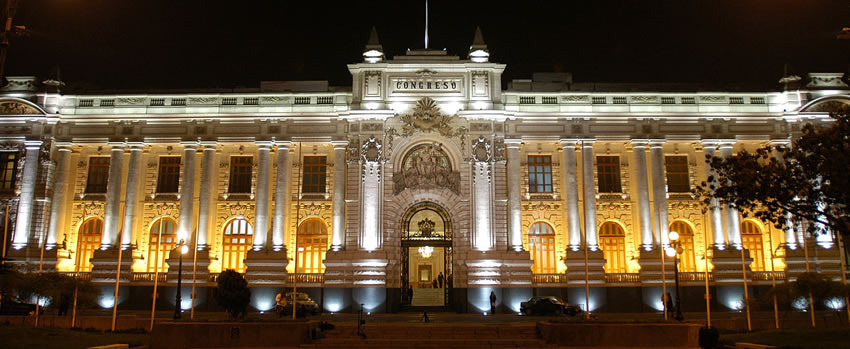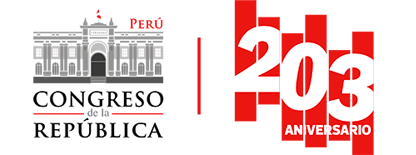“Año de la recuperación y consolidación de la economía peruana”
“Year of the Recovery and Consolidation of the Peruvian Economy”
“Jahr des Aufswungs und der Konsolidierung der peruanischen Wirtschaft”
“Année de la reprise et de la consolidation de l'économie péruvienne”
“Peru mamallaqtapaq qullqi kausarichiypaq, sinchiyachina wata”
ABOUT CONGRESS

The history of independent Peru started with the deliberations about the form of government to be adopted by the young republic. Since its inception, the Congress of the Republic has been closely tied to Peru’s contemporary history. Since 1822, under the initial presidency of Francisco Javier de Luna Pizarro, the institutional life of Congress has accompanied the most important events of Peruvian national life, representing the aspiration of Peruvians to lead their lives in order, peace and democracy.
Since its installation in the chapel of University of San Marcos, the Parliament has had its main offices in different buildings throughout its history. Traditionally, the Congress was bicameral. The Chamber of Deputies had sittings at University of San Marcos, and the Senate met at the old building of the Inquisition.
Miguel Grau Seminario, our national hero, personifies the ideal of a parliamentary representative, who acted responsibly to the mandate of his people, and who was respectful of the legal order of the Republic. While he was serving his parliamentary mandate, he sought authorization from his chamber to go to war, and defend the national sovereignty.
The history of Congress is also the history of Peru’s Constitutions; that is the reason that all the Presidents-elect, by invoking God and the Nation, swear into office before the Congress, the seat of people’s power, to strictly observe the laws, and promise to watch over the country’s interests.
The parliamentary institution has one first and historical responsibility: the creation of law. The Political Constitution of Peru sets forth several avenues to the formulation and enactment of legislation.
Another important congressional function is the parliamentary oversight of the acts of the Executive branch, and the public administration in general. This is exerted through information requests, or by calling the Ministers to appear before the Plenary of Congress and the Committees, and by exerting control over the executive decrees issued by the President of the Republic.
The Congress represents the plural opinion of the nation. Representatives of all races, creeds, ideologies, professions, and crafts are elected by democratic votes, on the basis of the people’s decision.
The Members of the Congress are elected to serve the nation, legislate, control and represent our interests and aspirations. Therefore, they enjoy immunity and cannot be held responsible for their views and votes, or be prosecuted without the Congress authorization. Citizens should see in their representative a liaison between themselves and the State.
The Members’ dedication to the congressional activity is full time, with the exception of their contribution in college teaching. The acts of the Congress and its members are public. Citizens learn about these acts through the media.
Today, the Congress of the Republic has taken on the challenge of modernizing its systems, procedures, infrastructure, and equipment. And it does so with a strong will, aware of the fact that the future must be built today, and bearing in mind the legacy of eminent predecessors that laid the foundations of our democracy, and committed our effort to maintain and develop it.
SOURCE:
Area Information Services and Documentary






